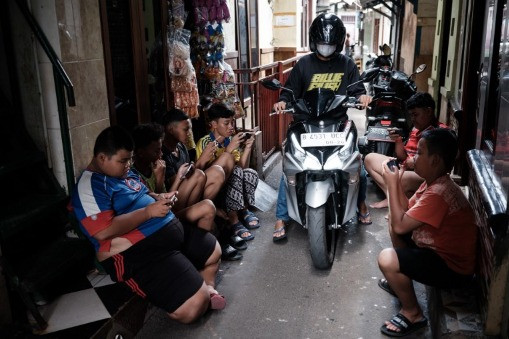Popular Reads
Top Results
Can't find what you're looking for?
View all search resultsPopular Reads
Top Results
Can't find what you're looking for?
View all search resultsSchizophrenic patients keep hopes alive
In chains: Fifteen-year-old Jamil makes origami with his leg chained to a wall at his home in Jakarta
Change text size
Gift Premium Articles
to Anyone
I
span class="caption" style="width: 509px;">In chains: Fifteen-year-old Jamil makes origami with his leg chained to a wall at his home in Jakarta. Many patients with mental health problems are shackled in their homes due to a lack of access to modern health services. (JP/Wendra Ajistyatama)
A 50-year-old man sat quietly on top of a large stone, resting against the brick wall of a modest home in Paringan village, Ponorogo, East Java.
He smiled at Ponorogo Deputy Regent Yuni Widyaningsih, who was walking in his direction.
The man, Supri, had nowhere to go as a chain had rendered him immobile outside of his parents' home for more than two decades.
Supri was one of the first of 81 schizophrenic patients in Ponorogo to be released from confinement earlier this week and would soon be taken to a mental health facility to receive proper treatment.
Supri, like others in his village suffering from mental problems, had been placed in shackles simply because it was considered normal practice in the poor village.
The Ponorogo administration, however, is determined to put an end to this practice.
'Let's stop calling Ponorogo a 'village of idiots'. We exposed this practice to the media because we want it to end,' Yuni told reporters on Tuesday.
In 2009, a village in Ponorogo, Karang Patihan, made headlines after it was reported that 111 people in the area, aged between 5 and 40, were diagnosed with mental disabilities. Local doctors said the problems had resulted from severe malnutrition.
Local media have referred to Karangpatihan as 'the village of idiots'.
Locals said mental problems were curses and relied on local shamans for treatment.
A lack of modern health facilities were also to blame.
A local social worker, Tajib, who has been assisting Supri's family, said most patients had sought help from shamans due to a lack of modern medication.
He said Supri had been diagnosed with a mental illness soon after he joined an Islamic sect in the 1980s, but with no modern medication available, his family resorted to Islamic healing methods.
Supri, who is the son of a farmer, however, was frequently treated in a mental hospital in Solo, Central Java. But with no financial support, Supri had to stop taking his medication.
Supri strangled a Muslim healer who tried to give him medication.
'After he murdered the healer, all of his neighbors were terrified of him. His parents later decided to put him in chains because medication was too expensive,' Tajib said.
Modern medication only became available in 2011, when the local administration built a community health center in the area.
The health center has mental health workers on-hand and provides free medication for schizophrenic patients.
Deputy Regent Yuni said her administration had allocated around Rp 400 million (US$35,600) from the local budget for free medication for mental illness patients.
For the program, the local administration received assistance from the Indonesian Psychiatric Association (PDSKJI), Community of Indonesian Care for Schizophrenia (KPSI), Indonesia's Mental Health Hospitals and Drug Dependence Association (ARSAWAKOI) and Menur Mental Hospital in Surabaya.
In 2010, the government pledged to abolish the practice putting mental patients in chains by 2014. Data from the Health Ministry said there were 18,800 schizophrenic patients in Indonesia that were confined in 2011. The data also said that 4,800 of them have been released.
Yuni said that to meet the 2014 target, the administration aimed to release at least eight patients every month and send them to mental institutions in Solo and Surabaya.
Ponorogo Health Agency chief Priyo Langgeng said that the regency had five private hospitals and one state-run hospital, but none of them were equipped with facilities for people with mental illness.
'The only mental health facility that we have is Paringan Puskesmas. Within the next two years, we will have a resident psychiatrist at the Puskesmas. Our next project is to build inpatient facilities for mental illness patients at RSUD (state-owned general hospital) Harjono in Ponorogo,' Priyo said.










